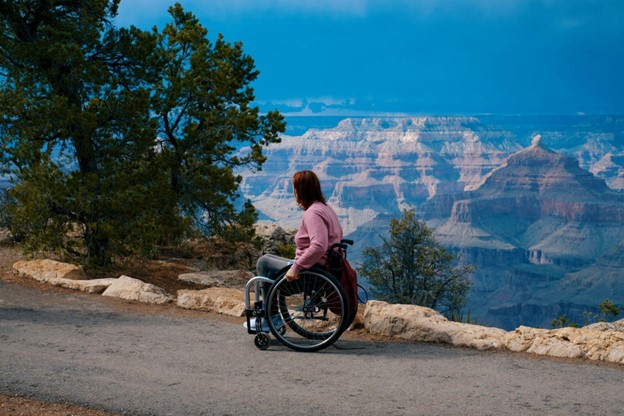My blog focuses on Health/Wellness. Many people develop chronic illnesses at some point in their lives. This creates all kinds of changes for us and those around us. The following contributed post is entitled, Navigating Life After Becoming Chronically Disabled.
* * *
Adjusting to life after becoming chronically disabled is very emotional and also logistically taxing, but with the right resources and community support available, after being diagnosed it can become an enriching journey of adaptation and purpose.

Photo by Romain Virtuel on Unsplash
Support Through Life Care
Working with a life care planning company can give you invaluable guidance and resources. These experts specialize in creating custom plans tailored to your specific needs, helping you to address challenges and reach your long-term goals more easily. They cover things like managing medical services and even finding the right programs for you. Life care planners offer holistic approaches that enhance your quality of life, covering everything from financial to resource allocation so as to give you a more secure future.
Building a Support Network
Surrounding yourself with a strong support network is important when managing your chronic disability. Family, friends, healthcare providers and advocacy groups can all give you emotional support, practical assistance and moral encouragement as you make life-altering decisions. Peer support communities, whether they are online or in person, can be life changing. Sharing experiences with like-minded peers forms a sense of community while giving you amazing advice from people who understand your daily struggles. Advocating for your needs is important in building a network. From work, school and healthcare settings to social interactions such as events and sports leagues, being clear about the accommodations and expectations will make sure that you have smoother interactions and form an atmosphere that builds disability inclusion.
Mastering the Art of Adaptation
Living with a chronic disability does mean becoming more adapting. Mobility aids, accessibility apps and voice-activated devices all play an amazing role in making your everyday tasks easier. While time and energy management become important life skills. Those that are living with chronic conditions often learn the “spoon theory” approach for prioritizing activities that truly matter in balance with their physical or mental constraints. It’s not about doing everything but rather about doing what matters most. So you are adapting.
Rewriting Goals and Purpose
Living with a chronic disability doesn’t mean your dreams are unattainable and you should just forget about them. It may just mean they require reimagining. Setting meaningful goals, like creative outlets, new career paths, advocacy work or simply self-compassion, is very important in maintaining a sense of purpose. This can sometimes lead you to discover hidden talents or passions through this process. Meanwhile, self-compassion should not be neglected. Taking breaks for your mental health needs as well as practicing mindfulness are important parts of living a balanced life.
Conclusion
There’s no simple or clear-cut answer to “now what?”. Your life after becoming chronically disabled can be an unpredictable rollercoaster ride that is filled with challenges and opportunities too. But when you look for support, adapt to new realities, and remain open-minded to possibilities that come your way, living with chronic disability may lead you to growth and self-discovery. Chronic disability reshapes anyone’s life, but with resilience and resourcefulness it can open doors never thought possible before the chronic disability occurred. Stepping carefully forward could create meaning from living a valuable existence.
